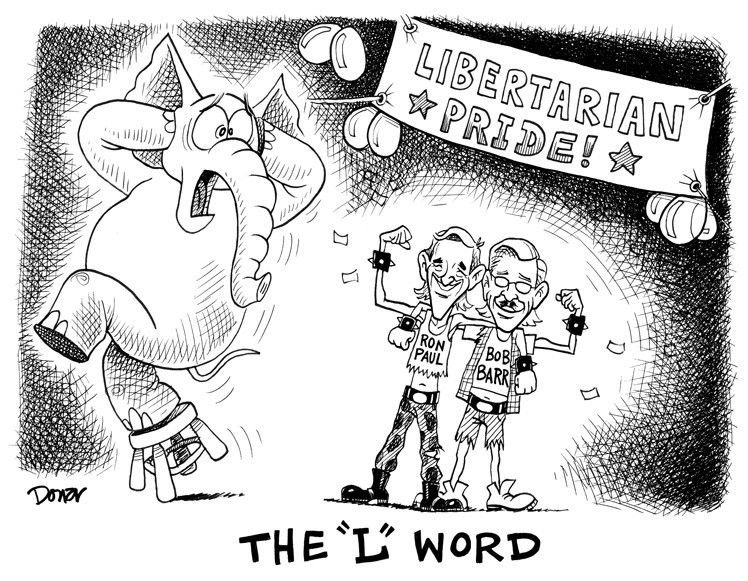Last week, in a discussion of California's newly-minted
Citizens Redistricting Commission, I noted that even though the commission is multi-partisan in character – by law, it consists of five Democrats, five Republicans and
five four individuals who are
not affiliated with either of the major parties – reporters, commentators and even commissioners themselves have continually referred to it as a "bipartisan" group, thereby revealing the prejudicial character of the ideology that sustains the two-party state. A more clear cut case of bipartisan bias – in which bipartisanship is falsely equated with non-partisanship – would probably be difficult to find. This week, however, political leaders in New York have provided us with a complimentary example of ideological prejudice.
On Monday, New York Governor Andrew Cuomo held a press conference with Democratic Assembly Speaker Sheldon Silver, Republican Senate Majority Leader Dean Skelos and a variety of public interest groups to unveil a new ethics law intended to "clean up Albany."
Bloomberg News describes the plan:
New York Governor Andrew Cuomo and legislative leaders agreed on an ethics law with stricter rules and enforcement for disclosure of financial assets and income. The accord obligates legislators and public officials to name their business associates and requires lawyers such as Assembly Speaker Sheldon Silver to reveal their clients.
The law will also create a new, strictly
bipartisan body with oversight powers that cover both the legislative and executive branches. Bloomberg New continues:
The legislation proposed today would create a 14-member Joint Commission on Public Ethics, replacing the existing Commission on Public Integrity with a bipartisan panel. Six members would be appointed by the governor and lieutenant governor, of which three must be from a political party other than the governor’s. Eight would be appointed by leaders of each house of the Legislature.
The
New York Times fills in some more detail:
The governor will have six appointees to the 14-member board: three Democrats and three Republicans. The speaker and Senate majority leader get three appointees apiece, while the minority leaders of each chamber get one appointee apiece. To undertake an investigation of any lawmaker, the votes of two of the four legislatively appointed commissioners who are in the same party as the lawmaker are required. As a result, three legislatively appointed commissioners could kill an investigation, even if the other 11 favor an inquiry.
Though the commission is strictly bipartisan in character, and therefore necessarily excludes independents and third party supporters, the governor and his allies have opted to frame it as an "independent" body. From the governor's official
press release announcing the agreement:
The Clean Up Albany Act of 2011 establishes an independent [emphasis added] Joint Commission on Public Ethics . . . .
"This bill is the tough and aggressive approach we need. It provides for disclosure of outside income by lawmakers, creates a true independent [emphasis added] monitor to investigate corruption," [said Cuomo himself] . . .
Steve Younger, Former President of the New York Bar Association said, "This is an historic moment for all New Yorkers. This new measure will enhance transparency in our government and ensure both independent [emphasis added] and fair enforcement of our ethics laws.
Of course, there is nothing "independent" about a strictly bipartisan body that is hand-picked by political leaders from the major parties in the legislature and the executive. Indeed, such subordination is the very definition of
dependency – never mind the fact that putting a commission composed solely of Democrats and Republicans in charge of ethics oversight is akin to appointing a gang of arsonists to oversee the local fire fighting brigade –. Moreover, as it now stands, this "independent," bipartisan commission currently has no way of investigating officials who are actually Independent, i.e. who have no party affiliation or who are affiliated with a third party: "the votes of two of the four legislatively appointed commissioners who are
in the same party as the lawmaker are required," as the NYT points out. At
Capitol Confidential, Jimmy Vielkind noted the obvious discrepancy earlier this week:
The bipartisan structure of the to-be-created Joint Commission on Public Ethics is carefully balanced (to the point some have criticized it) between the Republicans and Democrats, so neither party could conduct a “political witch hunt” against the other. But what about lawmakers enrolled in one of New York’s minor parties? “They don’t exist!” Gov. Andrew Cuomo jokingly said Monday . . . But there is currently one lawmaker who is an enrolled Independence Party member: Fred Thiele, of Suffolk County . . .
The proposed system would require the sign-off of two commissioners appointed by the legislature from the same party as the would-be investigation target. As such, how could anyone sign off on a probe of Thiele? And what might he do with his ethical invincibility??!? “Well, I don’t feel like I’m above the law,” he told me on the floor yesterday, laughing. “I caucus with the Democrats, so I guess, for the purposes of the ethics law, that’s where I would fall.”
Despite Thiele's nonchalance, others are taking the situation much more seriously. From
The Wall Street Journal:
The new ethics law being touted by Gov. Andrew Cuomo parcels equal roles to Democrats and Republicans in investigating lawmakers of both parties suspected of questionable conduct. What about independents?
"They don't exist," Mr. Cuomo said at a recent news conference, at which point he and legislative leaders standing beside him broke into a hearty laugh. But constitutional scholars aren't taking the matter so lightly.
They're warning that the state's new ethics body may be destined for legal challenges in federal court. By enshrining into law the perpetual dominance of Republicans and Democrats in overseeing ethics codes, Mr. Cuomo and lawmakers could be infringing on the rights of unaffiliated and minor-party citizens . . .
The Cuomo administration and lawmakers were careful to distribute power on the board evenly between Republicans and Democrats. In doing so, they've appeared to nearly wipe out the possibility for independents to occupy seats on the board.
If board membership is restricted to Republicans and Democrats, the "doors of a federal court would be open" to such a challenge, said Floyd Abrams, a prominent First Amendment lawyer.
According to the latest
enrollment statistics, just under three million New Yorkers profess no party affiliation or are enrolled with a third party. That is nearly 26% of all registered voters. In fact, there are more New Yorkers who have no party affiliation or who are enrolled with a third party than there are Republicans in the state! Yet, 100% of the members on the new "independent" ethics commission are Democrats or Republicans.
Considering the examples from New York and California together, we see two complimentary ways in which the ideology that sustains the two-party state operates in our political discourse to falsify reality. In California, a fairly independent, multi-partisan Commission is falsely portrayed as a strictly bipartisan body, while in New York, a politically dependent, strictly bipartisan Commission is falsely portrayed as an "independent" body.













